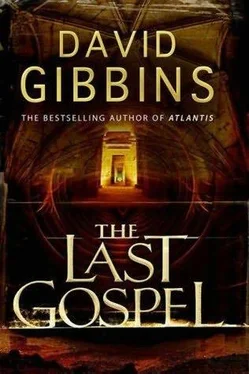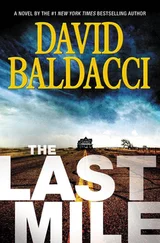David Gibbins - The Last Gospel
Здесь есть возможность читать онлайн «David Gibbins - The Last Gospel» весь текст электронной книги совершенно бесплатно (целиком полную версию без сокращений). В некоторых случаях можно слушать аудио, скачать через торрент в формате fb2 и присутствует краткое содержание. Жанр: Прочие приключения, на английском языке. Описание произведения, (предисловие) а так же отзывы посетителей доступны на портале библиотеки ЛибКат.
- Название:The Last Gospel
- Автор:
- Жанр:
- Год:неизвестен
- ISBN:нет данных
- Рейтинг книги:5 / 5. Голосов: 1
-
Избранное:Добавить в избранное
- Отзывы:
-
Ваша оценка:
- 100
- 1
- 2
- 3
- 4
- 5
The Last Gospel: краткое содержание, описание и аннотация
Предлагаем к чтению аннотацию, описание, краткое содержание или предисловие (зависит от того, что написал сам автор книги «The Last Gospel»). Если вы не нашли необходимую информацию о книге — напишите в комментариях, мы постараемся отыскать её.
The Last Gospel — читать онлайн бесплатно полную книгу (весь текст) целиком
Ниже представлен текст книги, разбитый по страницам. Система сохранения места последней прочитанной страницы, позволяет с удобством читать онлайн бесплатно книгу «The Last Gospel», без необходимости каждый раз заново искать на чём Вы остановились. Поставьте закладку, и сможете в любой момент перейти на страницу, на которой закончили чтение.
Интервал:
Закладка:
‘Sounds like Cousteau’s boys,’ Costas said. ‘Let me guess. Compressed air, twin hose regulators, no pressure gauge, no buoyancy system.’
‘Back when diving was diving,’ Jack said wistfully. ‘Before mixed gas took all the fun out of it.’
‘The danger’s still there, just the threshold’s deeper.’
‘Twenty years ago I volunteered to do a bounce dive to find those amphoras, but the team doctor vetoed it. We only had compressed air and were strictly following the US Navy tables, with a depth limit of fifty metres. We had no helicopter, no support ship, and the nearest recompression chamber was a couple of hours away in the US naval base up the coast.’
Costas gestured pointedly at the two mixed-gas rebreathers on the floor of the boat, and then at the white speck of a ship visible on the horizon, steaming towards them. ‘State-of-the-art deep-diving equipment, and full recompression facilities on board Seaquest II. Modern technology. I rest my case.’ He waved at the battered old diary Jack was holding. ‘Anyway, Greek amphoras. Isn’t that before our period?’
‘That’s what we assumed at the time. But something was niggling me, something I couldn’t be sure of until I saw those amphoras with my own eyes.’ Jack picked up a clipboard from the crate and passed it over to Costas. ‘That’s the amphora typology devised by Heinrich Dressel, a German scholar who studied finds from Rome and Pompeii in the nineteenth century. Check out the drawings on the upper left, numbers two to four.’
‘The amphoras with the high pointed handles?’
‘You’ve got it. Now, in Cousteau’s day, divers identified any amphora with those handles as Greek, because that was the shape of wine amphoras known to have been made in classical Greece. But since then we’ve learned that amphoras of that shape were also made in the areas of the west Mediterranean colonized by the Greeks, then later under the Romans when they conquered those areas. We’re talking southern Italy, Sicily, north-east Spain, all major wine-producing regions first developed by the Greeks.’ He passed over a large black and white photograph showing high-handled amphoras leaning against a wall, and Costas peered at it thoughtfully.
‘A wine storeroom? A tavern? Pompeii?
Jack nodded enthusiastically. ‘Not Pompeii, but Herculaneum, the other town buried by the eruption of Vesuvius. A roadside bar, preserved exactly as it was on 24 August AD 79.’
Costas was quiet for a moment, then squinted at Jack. ‘Remind me. What was the date of St Paul’s shipwreck?’
‘Best guess is spring AD 58, maybe a year or two later.’
‘Put me in the picture.’
‘A few years after the death of the emperor Claudius, in the reign of Nero. About ten years before the Romans conquer Judaea and steal the Jewish menorah.’
‘Ah. I’m with you.’ Costas gave Jack a tired smile, then narrowed his eyes again. ‘Nero. Gross debauchery, throwing Christians to the lions, all that?’
Jack nodded. ‘That’s one take on the history of the period. But it was also the most prosperous time in ancient history, the height of the Roman Empire. Wine from the rich vineyards of Campania around Vesuvius was being exported in those Greek-style amphoras all round the known world. They’ve even been found in the furthest Roman outposts in southern India, traded for spices and medicines like the opium in that chest. And they’re found in Britain. They’re exactly what you’d expect to find on a large Alexandrian grain ship of this period. According to the New Testament account in the Acts of the Apostles, there were more than two hundred and seventy people on board that ship with St Paul, and diluted wine would have been their staple drink.’
‘Last question,’ Costas said. ‘The big one. From what I remember, St Paul’s shipwreck was supposed to have been in Malta. How come Sicily?’
‘That’s why it never clicked twenty years ago. Then I did a bit of lateral thinking. Geographically, I mean.’
‘You mean you had a way-out hunch.’
Jack grinned. ‘It’s like this. All we have to go on is the Gospels, the Acts of the Apostles. There’s no other account of St Paul’s shipwreck, no way of verifying the story. Right?’
‘It’s all about faith.’
‘In a way, that’s the nub of it. The Gospels, the New Testament, were a collection of documents chosen by the early Church to represent the ministry of Jesus, or perhaps their view of the ministry of Jesus. Some of the Gospels were written soon after Jesus’ life, by eyewitnesses and contemporaries, others were written later. None of them were written as historical documents as we would understand the term, let alone geographical ones. To those who put the texts together, it was probably a matter of little consequence which island Paul was actually wrecked on.’
‘I had all this drummed into me by my Greek Orthodox family. Acts was written by a survivor of the wrecking, by Paul’s companion Luke.’
Jack nodded. ‘That was what everyone was taught. Acts tells us that Paul was accompanied by two men, Luke from Asia Minor and a Macedonian from Thessaloniki.’
‘Aristarchos.’
‘I’m preaching to the converted,’ Jack grinned. ‘You should be telling this.’
‘I can only give you the bare bones,’ Costas said. ‘After Paul was arrested in Judaea, they joined him on the voyage north from Caesarea to Myra in southern Turkey, where they transferred to an Alexandrian ship destined for Rome.’
‘That’s what we’re told,’ Jack said. ‘But we need to stand back from the detail. It goes back to what I said about reading the Gospels as history. That wasn’t their primary purpose. Some scholars now think Acts was composed several decades later by someone else, maybe based on an eyewitness account. And then there are questions over textual transmission. The Gospels went through the same process as all the other classical texts, all those except the fragments we’ve actually found in ancient sites. Sieved, purified, translated, embellished with interpretations and annotations which became part of the text, censored by religious authorities, altered by the whim or negligence of the individual copyist.’
‘You’re saying take the details with a pinch of salt.’
‘Be circumspect.’
‘A favourite word of yours these days.’
Jack grinned. ‘The earliest surviving fragment we have of Acts dates to about AD 200, almost 150 years after Paul, and it only contains the first part of the story. The earliest version with the wreck dates several hundred years later. It gets translated from Greek to Latin to medieval languages, to seventeenth-century English, goes through numerous scribes and copyists. It makes me very cautious, circumspect, about a detail like the word Melita, whether it even means Malta. Some ancient versions even render it as Mytilene, an island in the Aegean more familiar to Greek copyists of the Gospels.’
‘Treasure-hunting 101,’ Costas said solemnly. ‘Always authenticate your map.’
‘St Paul’s shipwreck is just about the first time in history that we can hunt a known wreck, but like so many wreck accounts it’s fraught with pitfalls. You have to stand back from it, open your mind to all the possibilities and let them fall into place, not force them towards a foregone conclusion. I think that’s what I’ve been doing over the years since I last dived here, since the idea first began to dawn on me.’
‘That’s why you’re an archaeologist, and I’m an engineer,’ Costas said. ‘I don’t know how you do it.’
‘And that’s why I leave robotics and submersibles to you.’ Jack grinned at Costas, then looked towards the eastern horizon. ‘There’s nothing else in Acts to corroborate Malta as the location, and all that happens on the island is that Paul heals some local man. Sicily makes a lot more sense. It’s in the right neck of the woods, a far more likely landfall for a grain ship blown off course in the Ionian Sea by a north-east wind. Acts even mentions Syracuse, just round the headland from us, where Paul and his companions spent several days on their eventual trip to Rome after the wrecking. According to Acts, they hitched a lift on another grain ship which had overwintered in Malta, but I believe that was far more likely to be a ship in the Great Harbour at Syracuse itself.’
Читать дальшеИнтервал:
Закладка:
Похожие книги на «The Last Gospel»
Представляем Вашему вниманию похожие книги на «The Last Gospel» списком для выбора. Мы отобрали схожую по названию и смыслу литературу в надежде предоставить читателям больше вариантов отыскать новые, интересные, ещё непрочитанные произведения.
Обсуждение, отзывы о книге «The Last Gospel» и просто собственные мнения читателей. Оставьте ваши комментарии, напишите, что Вы думаете о произведении, его смысле или главных героях. Укажите что конкретно понравилось, а что нет, и почему Вы так считаете.












